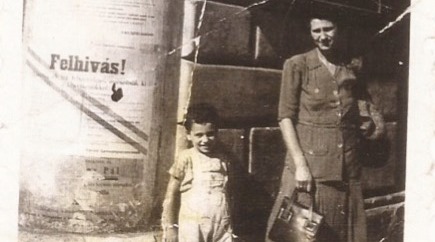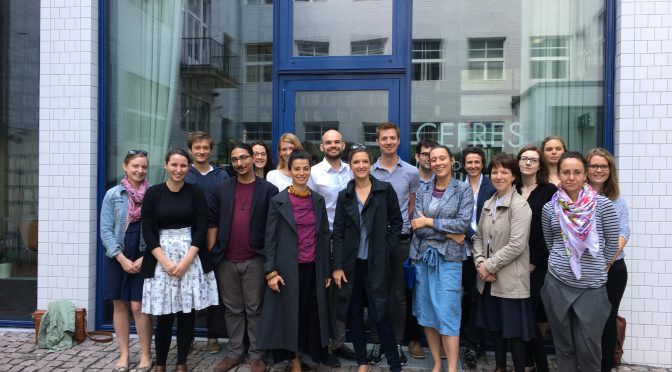
Deuxième séance du séminaire épistémologique commun du CEFRES et de l’IMS
Yuliya Moskvina (CEFRES / FSV UK)
Acteur critique et critique politique
Où : bibliothèque du CEFRES – Na Florenci 3, 110 00 Prague 1 (à confirmer)
Quand : de 15h30 à 17h
Langue : anglais
Texte :
Paul Blokker : European Crisis and Political Critique of Capitalism. in : European Journal of Social Theory, 17 (3) 2014, p. 258-274.
Lire plus d’information sur le séminaire !
Première séance du séminaire épistémologique commun du CEFRES et de l’IMS
Introduction par Clara Royer
Pourquoi nous avons besoin de concepts
Benedetta Zaccarello (CEFRES)
Les continuités dialoguées de la philosophie: à partir du concept de ‘scénario’ en philosophie contemporaine
Où : Bibliothèque du CEFRES – Na Florenci 3, 110 00 Prague 1
Quand : de 15h30 à 17h
Langue : anglais
Texte :
– Emmanuel de Saint Aubert : Le scénario cartésien. Recherches sur la formation et la cohérence de l’intention philosophique de Marleau-Ponty, Paris, Vrin, 2005, p.272
Lire plus d’information sur le séminaire !

Conférence d’Éva Kovacs (Vienna Wiesenthal Institute for Holocaust Studies) dans le cadre du séminaire d’histoire contemporaine des Juifs du CEFRES et de l’Institut d’histoire contemporaine (Académie des sciences), en partenariat avec l’Institut Masaryk (Académie des sciences).
Lieu: Bibliothèque du CEFRES, Na Florenci 3, Prague 1
Horaire: 17h-18h30
Langue: Anglais
Depuis vingt ans, grâce à l’ouverture des collections numériques aux États-Unis, en Israël et en Europe, l’utilisation des sources orales est devenue de plus en plus attractive pour les historiens. Ces archives rassemblent un très grand nombre de témoignages qui facilitent et accélèrent les recherches ; elles posent en revanche de complexes questions de méthodologie. Tandis que disparaissent les derniers survivants dont le témoignage pourrait être recueilli, ces sources orales vont bientôt devenir des archives « normales ». Tel est le défi auquel l’histoire de la Shoah fait face.
À partir du cas de la vie quotidienne d’environ 15 000 Juifs-Hongrois déportés aux travaux forcés à Vienne et ses environs en 1994 et 1945, nous conduirons une analyse critique et une étude méthodologique d’un large éventail de sources orales pour approcher des sujets pour lesquels nous disposons de très peu d’archives.
Voir ici la présentation du séminaire d’histoire contemporaine des Juifs.

Après une année passée au CEFRES, les doctorants de l’équipe 2016/2017 présenteront l’avancée de leurs travaux au cours d’un séminaire de conclusion, en présence des membres de la nouvelle équipe doctorale 2017/2018 et de leurs collègues du CEFRES. Le séminaire est précédé par l’accueil de la nouvelle équipe des doctorants et doctorants associés du CEFRES le matin.
Lieu et horaires : Na Florenci 3, bâtiment C, salle de conférences, 3e étage, entre 14h et 17h30
Langue : anglais
Programme
14h00 Mátyás Erdélyi : Modernity, Capitalism, and Private-Clerks: The Philosophy of Money in Austria-Hungary
14h30 Filip Herza : Freak Shows and the Collective Body of Nation in Prague 1860s-1930s: The Concept of Disability and Nationalism Studies
15h00 Katalin Pataki : From Victims to Collaborators: the Dissolution Procedure of Mendicant Monasteries in the Hungarian Kingdom (1787-1793)
15h30 Pause
16h00 Chiara Mengozzi (post-doctorante) : Literary Animals: Thinking Beyond Human, Reading Against Allegory
16h30 Magdalena Cabaj : From Hermaphrodite Writing to Intersex Writing
17h00 Lara Bonneau : Fall and Ascent: Reading Warburg with Binswanger

Une conférence prononcée par István Pál Ádám (CEFRES) dans le cadre du séminaire d’histoire moderne des Juifs de l’Institut d’histoire contemporaine (AV ČR) et du CEFRES en partenariat avec le Musée juif de Prague.
Où : bibliothèque du CEFRES – Na Florenci 3, 110 00 Prague 1
Quand : 17h – 19h
Langue : anglais
Résumé
Pendant la Deuxième Guerre mondiale, les concierges à Budapest ont représenté un lien entre les autorités et la majorité des résidents juifs de la ville. Leur rôle s’est accru en particulier au cours de l’été 1944 lorsque le ghetto de Budapest comptait près de 2 000 immeubles résidentiels. István Pál Ádám s’efforcera d’expliquer ce que les concierges ont pu gagner à aider les Juif persécutés à survivre.

Sixième session du séminaire épistémologique IMS / CEFRES :
Tomáš Mareš (IMS FSV):
Le concept de propagande. Connotations positives et négatives
Textes:
Où : bibliothèque du CEFRES – Na Florenci 3, 110 00 Prague 1
Quand : 15h30 – 17h
Langue : anglais





